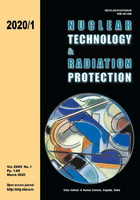
STUDY OF HYDRODYNAMICS PERFORMANCE OF A MULTI-VENTURI FILTERING SYSTEM FOR BWR SEVERE ACCIDENT VENTING STRATEGIES
Pages: 16-23
Authors: Alejandro Antonio Reyes-Garcia, Eduardo Sain-Mejia, Javier Ortiz-Villafuerte,
Javier C. Palacios-Hernandez, and Roberto Carlos Lopez-SolisAbstract
The aim of this project was to determine the capacity of a multi-venturi scrubber filtering system to cope with vented gas mass-flow rate coming from a BWR Mark II primary containment during a long-term station blackout. The multi-venturi filtering system CFD models were developed in the environment of the open source platforms SALOME and OpenFoam. The first geometrical model was created based on the dimensions of a well-known experimental setup, and the results of the pressure drop along the streamwise co-ordinate showed a maximum difference of 10 % in relation to the experimental values for different cases of liquid to gas mass ratios. Then a full scale multi-venturi model was developed. To study the performance of this system during conditions expected in a severe accident, a gas mixture similar to that occurring in a BWR Mark II containment at venting pressure was used as inlet gas. The gas mass-flow that can be cleansed by individual venturis and the pressure required to activate those venturis were computed. The pressure drop profiles in each sector were also determined as the function of different liquid loadings. The results showed good agreement with the capacity of the design taken as the reference model.
Key words: BWR, Mark II, severe accident, OpenFoam, SALOME, venturi scrubber
FULL PAPER IN PDF FORMAT (1,19 MB)
